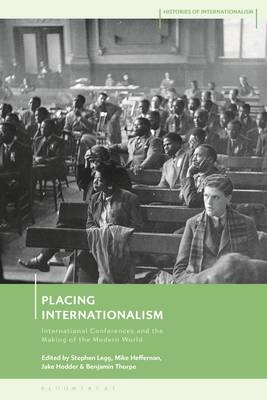
- Afhalen na 1 uur in een winkel met voorraad
- Gratis thuislevering in België vanaf € 30
- Ruim aanbod met 7 miljoen producten
- Afhalen na 1 uur in een winkel met voorraad
- Gratis thuislevering in België vanaf € 30
- Ruim aanbod met 7 miljoen producten
Placing Internationalism
International Conferences and the Making of the Modern World
Omschrijving
Exploring how modern internationalism emerged as a negotiated process through international conferences, this edited collection studies the spaces and networks through which states, civil society institutions and anti-colonial political networks used these events to realise their visions of the international.
Taking an interdisciplinary approach, contributors explore the spatial paradox of two fundamental features of modern internationalism. First, internationalism demanded the overcoming of space, transcending the nation-state in search of the shared interests of humankind. Second, internationalism was geographically contingent on the places in which people came together to conceive and enact their internationalist ideas. From Paris 1919 to Bandung 1955 and beyond, this book explores international conferences as the sites in which different forms of internationalism assumed material and social form. While international 'permanent institutions' such as the League of Nations, UN and Institute of Pacific Relations constantly negotiated national and imperial politics, lesser-resourced political networks also used international conferences to forward their more radical demands.
Taken together these conferences radically expand our conception of where and how modern internationalism emerged, and make the case for focusing on internationalism
in a contemporary moment when its merits are being called into question.
Specificaties
Betrokkenen
- Uitgeverij:
Inhoud
- Aantal bladzijden:
- 276
- Taal:
- Engels
- Reeks:
Eigenschappen
- Productcode (EAN):
- 9781350247215
- Verschijningsdatum:
- 29/06/2023
- Uitvoering:
- Paperback
- Formaat:
- Trade paperback (VS)
- Afmetingen:
- 156 mm x 234 mm
- Gewicht:
- 390 g

Alleen bij Standaard Boekhandel
Beoordelingen
We publiceren alleen reviews die voldoen aan de voorwaarden voor reviews. Bekijk onze voorwaarden voor reviews.






